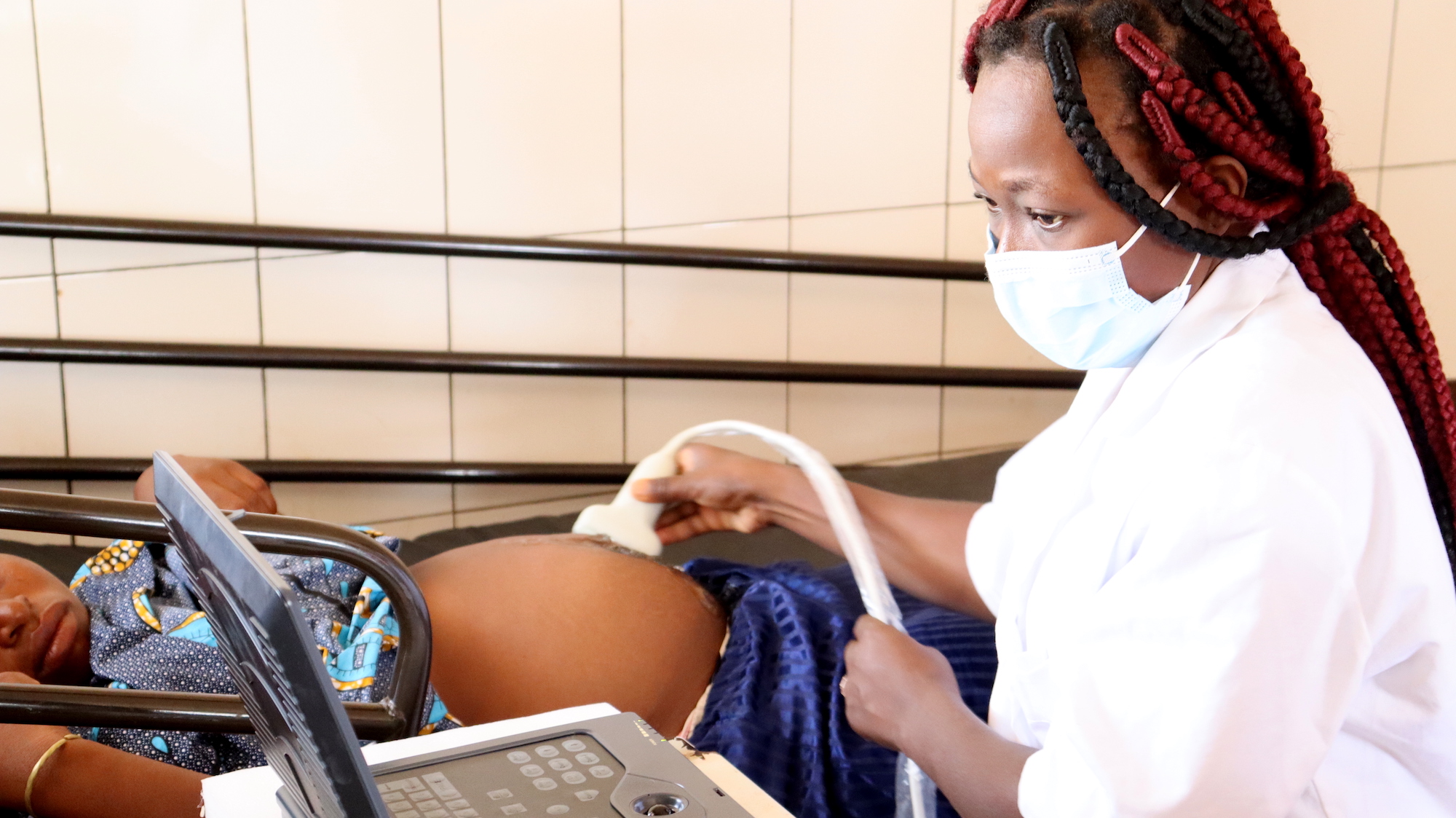Stella Ablavi Kossivi has been an Integrate Health-supported clinical mentor for nearly five years. When our communications team met her on a Tuesday morning in April, she was at the Sarakawa health center, which was packed with patients. In the small maternity ward, health workers were hard at work. That day, Stella was taking part in the setup of an ultrasound machine. While the biomedical technician was giving instructions on how to use the machine, Stella was carefully listening, not missing a word. Stella is part of a cohort of 20 midwives recently trained by the Ministry of Health to perform ultrasound screenings. She now supports the midwives from Kozah in carrying out the exam while making sure that the ultrasound program is implemented correctly.
Access to prenatal care in rural Togo
The Kozah district, where Stella works, is characterized by high rates of maternal deaths. Despite efforts by the government, this remains a major public health issue. The main causes of death are complications happening during pregnancy and delivery. Most of these complications can be detected using ultrasound technology during routine prenatal care, and therefore can be prevented, or planned for and treated.
In Togo, distance and cost constitute the main barriers to seeking care. Many women living in rural areas are kilometers away from the closest health center, without affordable means of transportation. Only obstetricians, gynecologists, and radiologists, based in regional hospitals, are trained on how to use ultrasound technology, meaning that this essential care is centralized in regional capital cities, even further away from rural women. Finally, an ultrasound exam costs on average 5,000 francs CFA (approximately $8 USD), which is a cost out of reach for many families. As such, it remains a difficult-to-access technology, leaving a gap in essential health service provision for rural women.
Bringing essential care to where patients are, when they need it.

The Integrated Primary Care Program (IPCP) is designed to address these key barriers to care. Integrate Health equips health centers with mobile ultrasound machines and trains midwives on how to use these machines during routine prenatal care.
In the Kara region, there are 19 portable ultrasound machines that are rotated among health centers each week to screen pregnant women across all 25 Integrate Health-supported health centers. Since prenatal consultations do not happen every day, health centers communicate their consultation schedule to the district authorities, who deploy the machines accordingly. Stella and her fellow clinical mentors train health center midwives to read the ultrasound images to detect danger signs including number of fetuses and positioning of the fetus, fetus abnormalities, and any signs of miscarriage. When these danger signs are identified early, midwives can act fast to ensure that women and their babies stay safe. Midwives can provide some treatment at the health center and can also refer women to regional hospitals for higher levels of care as necessary. These critical screenings can also identify if a cesarean section will be necessary, in which case pregnant women have time to plan for delivery at the regional hospital. All of these initiatives avoid emergency transport situations during delivery, which can have deadly consequences.
Scaling the ultrasound program with the Ministry of Health
Integrate Health has been supporting this ultrasound program across 25 health centers for a number of years, and our government partners have taken note. In 2021, given the success of the program, the Kara regional department of the Ministry of Health asked Integrate Health to support the scale-up of the program to the entire Kara region. From an NGO initiative to a government-owned regional program, the ultrasound program is proving to be an essential component of the primary care services package needed in Togo. And transferring ownership to our government partners is the only way to ensure its durability.
Integrate Health codeveloped the program strategy together with Kara regional health authorities, building off lessons learned from Integrate Health’s experience implementing the program. The two teams organized a training for 20 midwives selected from throughout the Kara region. The training started with a week-long classroom course on how to read ultrasound imaging for danger signs. To apply and practice their ultrasound skills, participants took part in internships under the supervision and coaching of physicians from the Lomé University Teaching Hospital.
“With this training, we will be able to detect potential complications faster and refer women when needed. This will improve quality of care.”
Stella Ablavi Kossivi, Clinical Mentor, Kozah Health Center
The regional health management team is working to implement the roving component of the program and is developing a funding strategy in order to make it available to a whole region. This program is key to reducing maternal deaths in the region. It will enable women, wherever they live, to have easy access to ultrasound technology free of charge. The ultrasound program is bringing lifesaving prenatal care closer to the patients we serve.

